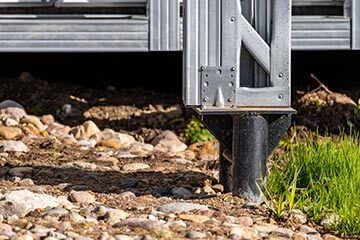An invalidated home insurance policy means it's considered void, or no longer valid. This often happens when you've given your insurer incorrect information or broken the terms of your policy.
Your insurer might not pay the claim out in full, or they might decide not to pay out at all. That’s why it’s important to be accurate when you’re getting home insurance. You should also tell your insurer if any of your details change.
Here's what you need to know.

Here’s what can invalidate your home insurance:
- Leaving your home unlocked
- If you or someone you live with lose your home’s key and don’t take proper action - like changing the locks
- Leaving your home unoccupied for over 30 days
- Not letting your insurer know about structural changes to your home, for example and extension
- Not telling your insurer about a lodger
- Over-valuing your contents
- Running a business from your home and not telling your insurer
- Not telling your insurer if something has changed - such as your address
Does using a key safe invalidate my house insurance
Not necessarily - it depends on the type of key safe and how it’s used.
Your insurer might recommend a key safe that they recognise as being particularly secure.
But regardless of how secure it is, you must make sure it’s operated properly. If it’s left open and you're burgled, your insurer could invalidate your policy and refuse to pay out if you need to claim.
Similarly, if everyone in your street knows the code to get into your key safe, you risk invalidating your house insurance policy.
Am I covered if I lose my keys?
If someone breaks into your home using a lost key, your home insurance might not cover you.
According to the Association of British Insurers, if money has been stolen there must be signs of forced entry.
For example, if someone finds your keys, traces them back to your home and uses them to gain access, your insurer might refuse your claim.
Or if a neighbour, friend or ex-partner uses a key you’ve given them to access your home and steal things, the same applies.
Several insurers say they'd class such an incident as an act of deception rather than as theft. So it might not be covered under a home insurance policy, though this isn’t guaranteed. Some insurers might still pay out.
It depends on whether your insurer believes you've taken the necessary steps to fully secure your home and fulfil your duty of care.
Will my insurance payout if someone in the home leaves my door unlocked?
Your insurer might not pay out if the door is left unlocked. Many home insurance policies require certain door locks to be fitted and locked when you leave the home. Your insurer could refuse a claim if a burglary happens as a result of the locks not being used.
If you’ve given someone a key, make sure they know to tell you straight away if they’ve lost it. That way you can take precautions such as changing the locks, if necessary.
What happens if I leave my house unoccupied?
If you leave your home unoccupied for a long time (usually over 30 days) your insurer might not cover you. Some policies are even more restrictive in the winter months. This is because there's greater chance of burst pipes causing damage in unheated homes.
Most house insurance policies have a limit on the number of consecutive days you can be away - this is usually around 30 days. If you need to make a claim it might be invalidated if your insurer finds the home has been left unoccupied.
If you need to leave the house unoccupied for longer than the limit outlined in your policy documents, speak to your insurer and see if you can get unoccupied property insurance.
Will DIY work invalidate my house insurance?
If you’re just doing superficial DIY like putting up a shelf or pictures your insurance probably won’t be invalidated if something goes wrong.
But if you're doing any DIY work that increases the value of your home - for example getting a new extension, you should let your insurer know.
This is because:
- After the work is done, your home insurance could be covering a property that's worth more, so it could cost more to repair any future damage
- If you’re having building work done your home is likely to be less secure and could make it more attractive to burglars
- With larger DIY jobs, there's an increased risk of you needing to make an expensive claim
Will getting a lodger affect my house insurance?
Getting a lodger shouldn’t invalidate your house insurance, but you should tell your insurer about them. Otherwise your insurance might be invalidated if you need to make a claim - even if the problem has nothing to do with the lodger.
Some insurers allow you to rent out part of your home to a tenant, but it could put up your annual insurance costs. Depending on the nature of the agreement, you might need to buy landlord insurance too.
What happens if I over-value my contents?
Over-insuring your contents can invalidate your policy. This is because of misrepresentation. There’s a risk that the insurer would have to pay out more than the value of the damaged or stolen contents.
Specify any individual high-risk items, and then try to calculate a realistic value of the rest of your contents. Our home contents calculator can help you with this.
Will using my home for my business invalidate my house insurance?
If you hold meetings or you have employees working from your home, you need to tell your insurer. Your standard buildings and contents insurance might not cover you.
If you use expensive equipment for work or store stock at your home your contents insurance isn’t likely to cover this either. Our guide on working from home insurance can give you more information, but it’s worth contacting your insurer to see what your options are.
Something’s changed and I haven’t told my insurer -could this invalidate my policy?
Yes - you need to let your insurer know of any changes. For example if you:
- Move house
- Change what your home is used for
- Get a criminal conviction
An example of this is if you tell your insurer that you have a burglar alarm and then you decide not to use it, or it gets broken and you decide not to replace it.
Not letting your insurer know about these kinds of changes could mean you don’t get a full or any payout if you need to claim. Your insurance policy could be void too.







